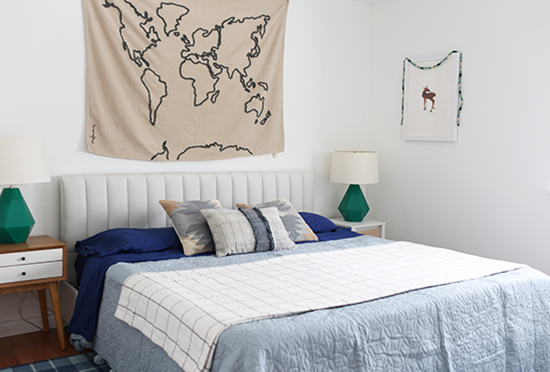02
This is a collaborative post. All opinions are my own.
This year, I have a big goal of saving enough for a downpayment on a rental house. I've been looking for extra ways to increase our earning in my "free time" with the kids (that's a post for another day). But just as importantly, I've been looking for ways to decrease our spending and get super frugal. The most common idea I hear is to save the $5 that would've gone to your latte, and sure that makes a difference if you're getting lattes every day. But actually, the lowest hanging fruit that can cut down your household expenses is the spending you don't even realize you're doing. It's the money you're literally wasting on things you don't notice at all. These are the easiest and least painful things to cut out of your monthly budget, leaving you more money for saving, spending on necessities, or getting the luxuries you actually crave.
Expense #1: Heating
Obviously I'm not saying you should never turn on the heat. But this is a big area where many of us are wasting money. How many times have you had the heat on and still felt cold in your home? How many times have you heated your entire house, even the rooms that you don't set foot in?
Tip: If your home feels cold, despite having the heat on, there might be areas of poor insulation. Instead of cranking the heat up to no avail, check your doors and windows for any air coming in and seal any gaps. And consider loft insulation to stop the heat escaping through the roof. When your home is better insulated, you might not need to have the heat on at all; at least not until later in the day when it might get chillier.
Next, don't heat the rooms you aren't using. Turn off radiators and close off vents in little-used rooms like guest rooms. And consider a newer thermostat with home automation. Rather than leaving the heat on while you're on vacation, you can schedule it to come on when you're on the way home, using your phone or other smart devices. Home automation also lets you manage the heat around your house, turning the temperature down in certain rooms while raising it in others when needed. The energy-saving advantages can outweigh the initial cost of setup.
Expense #2: Movies and television
We are spoiled for choice these days, with so many shows and movies on cable, as well as through the gazillion streaming services. There's Netflix, Hulu, and Amazon Prime, and I hear Apple is planning to get in on streaming too. But the more services we have, the more shows we're tempted to watch. And that's not only bad for our budget, but also for our time and brain cells. The more shows we watch, the more time we spend in front of the box trying to catch up with everything on our watchlists. And the more choices we have, the longer it'll take us to watch trailers and decide what to see on movie night. That's money wasted and time wasted!
Tip: For starters, consider ditching cable. While basic cable isn't very expensive, your bill might be higher if you have added premium channels such as HBO and Cinemax. If you are subscribing to one of the many streaming services, your favorite television shows will arrive on one or more of them at some point, so do you need cable at all? There will be loads of channels you don't actually watch with your cable subscription anyway, so why pay for them? It's a waste! Then consider the streaming services you subscribe to. If there are any that you rarely use, cancel your subscriptions. Then renew them when there is actually something you want to see. And then reduce your watchlists. There are too many things to watch, to be honest, so stick with the must-watch films and shows, delete the rest, and then use any free time you then have as a consequence to do something else with your time, such as a hobby that may have been neglected.
Expense #3: The cheapest options
Does this one surprise you? I'll admit it, cheap isn't always best. Cheap batteries generally run out faster than the more expensive varieties. Cheap tools are not only a health and safety hazard, but they tend to break faster than the more expensive alternatives. A cheap 90-cent bulb from your grocery store will die faster than the more efficient LED variety. And the knockoff toys you buy for your kids are guaranteed to break more easily than the more expensive models. I understand the temptation to go for the cheapest alternative, but it's often not the best choice in the long run. You will have to replace things when they fail, so you might end up paying more money than you would have originally.
Tip: When it comes to such things as tools and toys, do spend more, as not only will they be more durable, but they will pose less hazards to you and your family. When it comes to light bulbs, opt for LEDs or CFLs, as not only will they last longer, but they are more energy-efficient too. In such cases, spending more is a worthwhile option. And then consider those items where it's okay to spend less.
Expense #4: The expensive options
In some cases, as I just pointed out, paying the extra dollar is perfectly reasonable. Quality matters, especially when it comes to safety or a product's longevity. However, we can also waste money on items that are, let's be honest, ridiculously overpriced. Sometimes the cheaper generic version is 99% the same as the marked-up name brand. In particular, I'm looking at medications, breakfast cereals, groceries in general, and cleaning products. Designer clothes are also a big one. We associate the higher price with quality, but this isn't always the case.
Tip: When possible, try and avoid branded products. You might trust a name of a product you're familiar with, but before you automatically place it in your cart, see if there's a generic product that's almost exactly the same. Check the labels on the packaging, and opt for the cheaper version if there is little difference. And when it comes to cleaning products, you may not need to buy them at all. You can clean your house with DIY alternatives that save you money and reduce the chemicals in your house!
P.S. Along those lines, sometimes the biggest difference could be the store itself and not just the items. It might be convenient to go to the closest grocery store, or it might be more fun to shop at Whole Foods...but you'll save a lot (and I mean A LOT) if you make the effort to shop at the store with the best prices. Here is Washington, I tend to shop at WinCo and Costco, and sometimes Grocery Outlet. I can get the same exact items, for often about half the price.
Expense #5: Monthly subscriptions
There are so many subscription services nowadays: everything from makeup and razor blades, to groceries and wine. They often start with a free trial or introductory price that draws us in, then we forget to cancel or get lazy and used to the convenience. But here's the thing: that convenience comes at a price. Consider whether you're really using the products as they arrive, or if you're accumulating more than you need. If it's something that doesn't go bad, wouldn't it be easier just to stock up when it's on sale at the store and build your own supply that way?
Even worse than the subscription boxes, are the subscription services that get automatically billed. When something doesn't physically arrive in the mail every month, it's easy to forget about. Is there a subscription to an online magazine you don't actually read, or an annual fee for a service you've stopped using? Cancel those immediately!
Tip: Do a thorough audit of your expenses every month. If you have multiple cards, make sure to look through each one. Is there anything you don't recognize or totally forgot about? By ignoring the line items and only focusing on paying off the totals, we might be missing a "small" subscription fee of $12/month that's gone unnoticed for over a year, giving us zero value. I don't know about you, but I'd rather have three lattes a month than a subscription to something I never even use.
Final thoughts
This barely touches the tip of the iceberg, as each of us has different ways that we waste money on a regular basis. Personal finance is, after all, personal. So, only you can do the hard work of cutting down your expenses. Take a look at your receipts and bank statements and look at each line item critically. Then ask yourself two questions. 'Could I be paying less?' and 'Do I need this item/service at all?' Have a think and then adjust your spending accordingly.







Wow, that was incredible. This is an excellent post. Thank you for sharing this information.
This is awesome! Thank you for taking the time for sharing your article.
https://loftandinsulation.co.uk/under-floor-insulation/